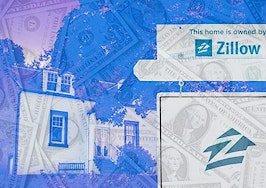This post has been republished with permission from Mike DelPrete.
Sometimes it’s easy to forget how much money iBuyers are losing. Investor presentations focus on positive unit economics, which don’t include non-trivial expenses, such as employee salaries, customer acquisition, technology development, office rent and more.
Neglecting these expenses — which account for hundreds of millions of dollars per year — paints an incomplete picture of iBuyer economics.

In the case of Opendoor, that’s an additional $366 million — or nearly $20,000 per home sold — of expenses in the “everything else” category. Contribution margin is a perfectly legitimate metric, but it doesn’t tell a complete story of profitability.
From profit to loss
A key measure of the iBuyer business model is gross profit, which is driven by service fees, purchase price, sale price, ancillary services (like title insurance and mortgage) and any necessary repairs. The metric focuses on the physical asset itself, and it doesn’t include costs associated with the process of selling the home.
In the first half of 2020, Zillow and Opendoor managed to generate around $17,000 in gross profit for each home bought and resold.

Zillow is catching up to Opendoor. If gross profit is a reflection of accurate pricing algorithms, competitive fees and attaching adjacent services, the evidence suggests that operational efficiency is not the exclusive domain of Opendoor.
After gross profit, the largest direct expenses are selling costs (primarily composed of commissions paid to agents), holding costs and interest expense. The data reveals that Opendoor has lower costs across all three categories.

Opendoor’s lead in holding costs and interest expense are marginal. Zillow’s recent announcement that it was hiring its own internal agents — and will no longer be working with (and paying) Premier Agent partners on the homes it sells — will reduce its selling costs to be closer in line with Opendoor.
Last come the indirect costs (employee salaries, marketing, office space, etc.) — perhaps indirectly linked to selling a home from an accounting perspective, but still critical to operating an iBuyer business. Zillow Offer’s financials highlight how significant these costs ($266 million) are in an overall picture of profitability.

Once all expenses are included, the economics are complete: Each iBuyer is losing tens of thousands of dollars on each home it buys and resells.

The overall economics are improving; between 2019 and the first half of 2020, each iBuyer lost less money on each home. But the totals are still negative, and when buying thousands of homes, total losses add up quickly: In the first half of 2020, Opendoor lost over $118 million, and Zillow lost over $178 million.
Red is the new black
At the end of the day, does it really matter? The information above is no secret; it’s readily available in the public disclosures and filings from both companies. But it does take a rainy afternoon to find, compute and digest the meaning of it all.
The public-facing presentations and shareholder letters focus on a single piece of the equation: unit economics or contribution margin. An equally easy to digest explanation of the full economic picture is not always present.
The iBuyers are playing by a different set of rules where profitability doesn’t apply. It doesn’t matter that iBuyers are unprofitable; to date, shareholders don’t mind, and they’re happy to subsidize massive losses. Disruption in real estate is being led by companies — and shareholders — willing to bet and lose billions of dollars.
Mike DelPrete is a strategic adviser and global expert in real estate tech, including Zavvie, an iBuyer offer aggregator. Connect with him on LinkedIn.







